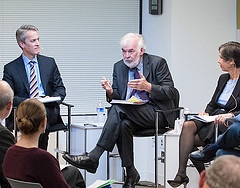The following story originally was published on the website for the IFPRI 2020 Policy Conference & Consultation on “Building Resilience for Food and Nutrition Security”.
Strengthening the resilience of smallholder farmers requires integrated programming across sectors and a coherent policy framework for resilience, according to panelists at a lead-in event for the 2020 conference. Tom Arnold of Concern Worldwide, Kathy Spahn of Helen Keller International (HKI), Martin Piñeiro of Grupo Consultores en Economia y Organizacion (Grupo Ceo), and Shenggen Fan of IFPRI, in an event moderated by John Heller of Synergos, shared their experiences and discussed knowledge gaps, opportunities for cross-sectoral collaboration, and policy and investment priorities to help build resilience for food and nutrition security.
Based on interventions in Niger and Kenya, Concern Worldwide has learned that building community resilience to undernutrition requires more than cash transfers and direct nutrition interventions. Arnold described Concern Worldwide’s efforts to implement a balance of interventions aimed at building the absorptive and adaptive coping strategies of communities through a new action research program in Chad. While it will take time for local institutions to build capacity to respond to shocks, said Arnold, “this is where NGOs can play a really important role—they can fill in capacity gaps with resources or with particular skills.”
HKI’s Homestead Food Production Program has similarly learned the importance of combining a food-based approach with nutrition education, behavior change communication, and livelihoods components to help smallholders build resilience to undernutrition. Spahn noted the importance of getting program design right and encouraged NGOs to “understand the program impact pathways that you want to influence and be sure that you’re addressing not only the immediate causes of poor nutrition but also looking at the underlying determinants” such as food insecurity, poverty, the low status of women, and lack of linkages to healthcare.
Part of the challenge of building resilience for smallholders is that the concept of resilience has not been precisely defined. He said, “We should recognize resilience as a special dimension of development. [Within] development…. we normally think in three dimensions: growth, poverty, and sustainable development.” Adding resilience as a fourth dimension would integrate it into development work and reduce the tensions between long-term development and short-term crisis response.
Fan noted that in addition to the challenge of defining resilience, there is much work to be done on measuring resilience and developing the right instruments for measurement. He added that different institutions, investments, and policy frameworks can strengthen the resilience of smallholder farmers by increasing their access to technologies, irrigation, and markets. Fan concluded that “resilience will be a critical element of eradicating hunger and poverty in the post-2015 development context.”
As smallholder farmers face increasingly frequent and intense economic, environmental, and political shocks, they are challenged to anticipate, prepare for, cope with, and recover from these events. The panelists agreed that smallholders will be better able to meet this challenge if NGOs, governments, research institutions, and development organizations work together to improve the evidence base, learn from past lessons in programming, and develop policy frameworks for resilience.
Related materials







